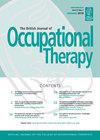Class of international functioning disability and health core sets for autism spectrum disorder: Occupational therapists’ perspective
IF 1.3
4区 医学
Q3 REHABILITATION
引用次数: 0
Abstract
Purpose:This study was conducted to examine the ICF Core Sets prepared for autism from the perspective of occupational therapists within the scope of the International Classification of Functioning, Disability, and Health.Materials and Methods:Data were collected from 70 occupational therapists working with children diagnosed with autism spectrum disorder. Opinions of the participants were collected using the three-stage Delphi technique.Results:In the first Delphi round in which 70 occupational therapists from our country participated, a total of 2952 concepts related to autism spectrum disorder were named. The collected responses were associated with 142 ICF categories, excluding personal factors, and then the number of categories was reduced to 132 because 10 of them were mentioned by less than 5% of the respondents. While consensus was achieved in 82% of the 111 categories in the comprehensive ICF Core Sets for autism spectrum disorder .Discussion and Conclusion:According to the results of this study, ICF-CSs prepared for autism spectrum disorder overlap with the perspective of occupational therapists to define the physiological, occupational, environmental, and personal factors affecting individuals with autism spectrum disorder . The high level of consensus among occupational therapists underscores the practical applicability and acceptance of ICF Core Sets in the field.自闭症谱系障碍的国际功能残疾和健康核心组类别:职业治疗师的观点
目的:本研究在国际功能、残疾和健康分类的范围内,从职业治疗师的角度研究为自闭症准备的ICF核心集。结果:在有我国 70 名职业治疗师参加的第一轮德尔菲讨论中,共有 2952 个与自闭症谱系障碍相关的概念被命名。收集到的回答与 142 个 ICF 类别相关联(不包括个人因素),然后类别数量减少到 132 个,因为其中 10 个类别只有不到 5%的受访者提及。讨论与结论:根据本研究的结果,为自闭症谱系障碍编制的 ICF-CS 与职业治疗师定义影响自闭症谱系障碍患者的生理、职业、环境和个人因素的观点重叠。职业治疗师之间的高度一致强调了 ICF 核心内容在该领域的实际应用性和可接受性。
本文章由计算机程序翻译,如有差异,请以英文原文为准。
求助全文
约1分钟内获得全文
求助全文
来源期刊

British Journal of Occupational Therapy
REHABILITATION-
CiteScore
2.20
自引率
15.40%
发文量
81
审稿时长
6-12 weeks
期刊介绍:
British Journal of Occupational Therapy (BJOT) is the official journal of the Royal College of Occupational Therapists. Its purpose is to publish articles with international relevance that advance knowledge in research, practice, education, and management in occupational therapy. It is a monthly peer reviewed publication that disseminates evidence on the effectiveness, benefit, and value of occupational therapy so that occupational therapists, service users, and key stakeholders can make informed decisions. BJOT publishes research articles, reviews, practice analyses, opinion pieces, editorials, letters to the editor and book reviews. It also regularly publishes special issues on topics relevant to occupational therapy.
 求助内容:
求助内容: 应助结果提醒方式:
应助结果提醒方式:


